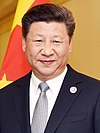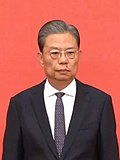First session of the 14th National People's Congress
Election session in China From Wikipedia, the free encyclopedia
The first session of the 14th National People's Congress (Chinese: 第十四届全国人民代表大会第一次会议) was held in March 2023 at the Great Hall of the People in Beijing, China. The session opened on 5 March and concluded on 13 March. Major state positions of China were elected in this session.[1]
| |||||||||||||
|---|---|---|---|---|---|---|---|---|---|---|---|---|---|
| |||||||||||||
| |||||||||||||
| Website | |||||||||||||
Preparation
On 30 December 2022, the Standing Committee of the 13th National People's Congress announced that the 14th NPC would open its first session on 5 March.[2]
On 4 March 2023, the Council of Chairpersons of the Standing Committee of the 13th NPC held its 136th meeting. The meeting submitted the draft list of the presidium and secretary-general of the upcoming NPC session, along with its the draft agenda.[3] The same day, the preparatory meeting of the first session of the 14th NPC was held, presided by NPC Standing Committee chairman Li Zhanshu. The meeting elected the presidium and secretary-general, and adopted the submitted agenda.[4] Zhao Leji was elected as the chairman of the presidium.
The session
Summarize
Perspective

The first session opened on 5 March, presided by Presidium Chairman Zhao Leji. Premier Li Keqiang gave a work during the meeting. Delegates voted to appoint the chairperson, vice chairpersons and members of two special committees; the Constitution and Law Committee and the Financial and Economic Affairs Committee.[5]
On 7 March, the second plenary meeting of the first session was held. During the meeting, NPCSC chairman Li Zhanshu, Supreme People's Court president Zhou Qiang, and Procurator-General of the Supreme People's Procuratorate Zhang Jun gave work reports. State Councilor Xiao Jie gave an explanatory speech about reforming State Council institutions.[6]
On 10 March, the third plenary meeting was held. During the meeting, the NPC voted to elect the president and vice president of the PRC, chairman of the PRC Central Military Commission, chairman of the NPCSC as well as other state leaders. During this meeting, Xi was unanimously elected for an unprecedented third term as president.[7][8][9] The NPC also voted on the plan to reform State Council institutions.[10] On 11 March, the fourth plenary meeting was held. The premier, vice chairpersons of the CMC, director of the National Supervisory Commission, president of the Supreme People's Court, Procurator-General of the Supreme People's Procuratorate as well as members of the NPCSC.[11] The fifth plenary meeting, held on 12 March, elected the new State Council, including vice premiers, state councilors, secretary-general and ministers.[12]
On 13 March, the closing meeting of the first session was held; President Xi Jinping delivered a speech.[13]
Voting results
State positions
| NPCSC Chairman Election | NPCSC Secretary-general Election | ||||||
|---|---|---|---|---|---|---|---|
| Candidates | For | Against | Abstain | Candidates | For | Against | Abstain |
| Zhao Leji | 2952 | 0 | 0 | Liu Qi | 2952 | 0 | 0 |
| Presidential Election | Vice Presidential Election | ||||||
| Candidates | For | Against | Abstain | Candidates | For | Against | Abstain |
| Xi Jinping | 2952 | 0 | 0 | Han Zheng | 2952 | 0 | 0 |
| NPCSC Vice Chairperson Election | NSC Director Election | ||||||
| Candidates | For | Against | Abstain | Candidates | For | Against | Abstain |
| Li Hongzhong | 2950 | 1 | 1 | Liu Jinguo | 2943 | 3 | 1 |
| Wang Dongming | 2952 | 0 | 0 | ||||
| Xiao Jie | |||||||
| Zheng Jianbang | |||||||
| Ding Zhongli | |||||||
| Hao Mingjin | |||||||
| Cai Dafeng | |||||||
| He Wei | Liu Yuan | 1 | 0 | 0 | |||
| Wu Weihua | |||||||
| Tie Ning | |||||||
| Peng Qinghua | |||||||
| Zhang Qingwei | |||||||
| Losang Jamcan | |||||||
| Shohrat Zakir | |||||||
| Premierial Nomination | Vice Premierial Nomination | ||||||
| Li Qiang | 2936 | 3 | 8 | Ding Xuexiang | 2944 | 0 | 2 |
| He Lifeng | 2943 | 3 | 0 | ||||
| Zhang Guoqing | 2946 | 0 | 0 | ||||
| Liu Guozhong | 2946 | 0 | 0 | ||||
| CMC Chairmanship Election | CMC Vice Chairmanship Election | ||||||
| Candidates | For | Against | Abstain | Candidates | For | Against | Abstain |
| Xi Jinping | 2952 | 0 | 0 | Zhang Youxia | 2944 | 1 | 2 |
| He Weidong | 2947 | 0 | 0 | ||||
| Supreme Court President Election | Procurator-General Election | ||||||
| Candidates | For | Against | Abstain | Candidates | For | Against | Abstain |
| Zhang Jun | 2947 | 1 | 3 | Ying Yong | 2947 | 3 | 7 |
Resolutions
| Topic | For | Against | Abstain | Rate |
|---|---|---|---|---|
| Premier Li Keqiang's Government Work Report | 2,946 | 0 | 1 | 99.97% |
| State Council Institutional Reform Plan | 2,951 | 1 | 0 | 99.97% |
| Measures for Election and Decision on Appointments for the 1st Session of the 14th NPC | 2,948 | 1 | 3 | 99.03% |
| Amendment to the Legislation Law | 2,924 | 12 | 11 | 99.86% |
| Report on the Implementation of the 2022 National Economic and Social Development Plan and the 2023 Draft Plan | 2,912 | 22 | 13 | 98.81% |
| Report on the Execution of the Central and Local Budgets for 2022 and on the Draft Central and Local Budgets for 2023 | 2,897 | 30 | 20 | 98.30% |
| Chairman Li Zhanshu's NPCSC Work Report | 2,931 | 11 | 4 | 99.46% |
| Chief Justice Zhou Qiang's Supreme People's Court Work Report | 2,874 | 49 | 24 | 97.73% |
| Procurator-General Zhang Jun's Supreme People's Procuratorate Work Report | 2,880 | 40 | 27 | 97.52% |
Economic targets and budget
Summarize
Perspective
The following economic targets were set by the government work report submitted to the NPC:
The NPC session also adopted the following central government budget:
Government budget
In trillions of renminbi:
| Planned | % change | Actual | |
|---|---|---|---|
| Central general public budget revenue | 10.017 | 5.6 | 9.957 |
| Central general public budget expenditure | 13.902 | 4.7 | 14.117 |
| Central government expenditure | 3.789 | 6.5 | 3.822 |
| Transfer to local governments | 10.063 | 3.6 | 10.295 |
| Local general public budget revenue | 11.716 | 7.6 | 11.722 |
| Local general public budget expenditure | 23.674 | 5.2 | 23.635 |
| National general public budget revenue | 21.730 | 6.7 | 21.678 |
| National general public budget expenditure | 27.513 | 5.6 | 28.243 |
Central public budget expenditure
In billions of renminbi:
| Planned | % change | Actual | |
|---|---|---|---|
| General public services | 156.8 | –0.7 | 151.6 |
| Diplomacy | 54.8 | 12.2 | 57.0 |
| National defense | 1,553.7 | 7.2 | 1,553.7 |
| Public security | 208.9 | 6.4 | 224.6 |
| Education | 155.4 | 2 | 157.1 |
| Science and technology | 328.0 | 2 | 337.1 |
| Culture, tourism, sports and media | 17.3 | –0.3 | 17.3 |
| Social security and employment | 99.2 | 19 | 105.4 |
| Health | 22.7 | 2.9 | 29.7 |
| Energy conservation and environmental protection | 16.2 | –8.6 | 19.6 |
| Urban and rural communities | 0.3 | 5.3 | 0.3 |
| Agriculture, forestry and water | 21.9 | –12.1 | 25.7 |
| Transportation | 62.0 | –2.4 | 77.3 |
| Resource exploration and industrial information | 36.9 | 5.2 | 40.4 |
| Commercial services | 3.8 | 11.8 | 3.0 |
| Financial | 40.5 | –4.2 | 52.5 |
| Natural resources, oceanography and meteorology | 25.5 | –1.6 | 28.6 |
| Housing security | 62.2 | 0.9 | 62. |
| Stockpiling grain, edible oils, and other materials | 132.8 | 13.6 | 130.1 |
| Debt interest payments | 723.0 | 10.8 | 694.6 |
| Total | 3,789.0 | 6.5 | 3,821.9 |
National general public budget expenditure
In billions of renminbi:
| Spending | % change | |
|---|---|---|
| Education | 4,124.2 | 2.0 |
| Science and technology | 1,082.3 | 7.9 |
| Culture, tourism, sports and media | 396 | 1.2 |
| Social security and employment | 3,988.3 | 8.9 |
| Health and medical | 2,239.3 | –0.6 |
| Energy conservation and environmental protection | 563.3 | 4.1 |
| Urban and rural community | 205.3 | 5.7 |
| Agriculture, forestry and water | 2,396.7 | 6.5 |
| Transportation | 1,220.6 | 1.3 |
| Debt interest payments | 1,182.9 | 4.2 |
| Total | 27,457.4 | 5.4 |
Source:[22]
References
External links
Wikiwand - on
Seamless Wikipedia browsing. On steroids.





